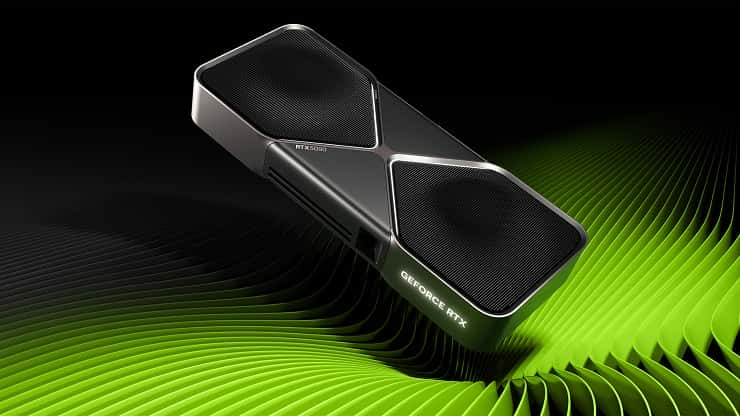Discover the key differences between the RTX 5090 and RTX 4090. Check out performance comparisons, specifications, and new features!
With the arrival of the GeForce RTX 5090, NVIDIA is ushering in a new generation of graphics cards, introducing impressive innovations in both hardware and software.
This evolution promises to reshape the market, delivering even higher performance and enhancements in technologies like AI and ray tracing. But what exactly changes between the RTX 5090 and RTX 4090?
In this detailed comparison, discover the key differences and innovations. Keep reading to see how this new GPU could revolutionize your experience!
Key Advances of the RTX 5090 Over the RTX 4090
The Blackwell series, represented by the RTX 5090, brings significant improvements over the Ada Lovelace generation. One of the highlights is the 5th generation Tensor Cores, which enhance AI capabilities and optimize features like DLSS. These cores work alongside the 4th generation RT Cores, delivering superior ray tracing performance—a technology where NVIDIA continues to lead the industry.
In terms of performance, the RTX 5090 offers up to twice the capacity in certain scenarios, according to data provided by NVIDIA. A standout example is seen in games like Cyberpunk 2077 at 4K resolution with path tracing enabled, as well as software like D5 Render, widely used in graphic design and engineering.

In the image above, we can clearly see the impact of this superior performance across a range of games and applications. The RTX 5090 easily outperforms the RTX 4090, especially in scenarios that use the new DLSS 4 with Multi Frame Generator (MFG).
GDDR7 Memory: The Future of GPUs
Another significant advancement of the RTX 5090 is the introduction of GDDR7 memory, which promises to nearly double the bandwidth compared to the GDDR6X found in the RTX 4090. The RTX 5090 is equipped with 32 GB of GDDR7 memory, operating at an impressive 28 Gbps and utilizing a 512-bit memory bus.
This setup results in a maximum bandwidth of 1.792 GB/s, making it ideal for high-performance gaming and professional applications that require large-scale data transfer.
Additionally, the increase in total memory to 32 GB marks a milestone for GPUs aimed at the gaming audience, enhancing the ability to handle complex textures and ultrarealistic environments in modern games.

Compact Design and Increased Power Consumption
While the RTX 5090 features a more compact reference design, occupying only two slots, its power consumption has seen a significant increase. The 575W TDP represents a 22% rise compared to the RTX 4090, requiring robust power supplies. To address this challenge, the RTX 5090 Founders Edition includes an enhanced cooling system, featuring 3D Vapor Chamber technology and a ventilated backplate to improve heat dissipation.
On the flip side, the starting price of $1,999 places the RTX 5090 in the premium category, making it the most expensive NVIDIA graphics card aimed at the gaming market to date. Customized models may exceed this price, which poses a barrier for many consumers.
NVIDIA has announced that the RTX 5090 will be available starting January 30, alongside the RTX 5080. Initially, the GPUs will be released in North American and European markets, while the launch in Brazil has yet to be confirmed.
Technical Comparison Between RTX 5090 and RTX 4090
Below are the detailed specifications for both graphics cards:
| Specifications | RTX 5090 | RTX 4090 |
|---|---|---|
| GPU | RTX 5090 | RTX 4090 |
| CUDA Cores | 21.760 | 16.384 |
| Tensor/RT Cores | 680/170 | 512/128 |
| Clocks base e boost | 2,01/2,41 GHz | 2,23/2,52 GHz |
| Memory | 32 GB GDDR7/512-bit | 24 GB GDDR6X/384-bit |
| Memory Speed | 28 Gbps/1.792 GB/s | 21 Gbps/1.01 TB/s |
| TDP | 575W | 450W |
| Launch Price | US$ 1.999 | US$ 1.599 |
| DLSS 4 | Yes | No |
| Slots | 2 | 3+ |
The new RTX generation promises to take performance in gaming and professional applications to the next level, but do the improvements justify the price? Share your opinion in the comments and let us know what you’re expecting from this new generation of GPUs.



